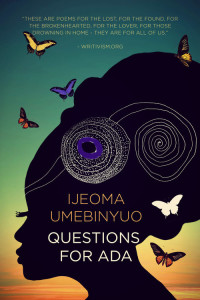My friend Audrey recommended this extraordinary collection of poems. Umebinyuo’s first book has received lots of well-deserved praise for its passion and openness. You can read individual quotes online, but reading the book as a whole is a different experience altogether.
She writes of love and brutality and pain in the lives of women and of men, too. Yet each poem tells us that we can still rise. Umebinyuo is the sister, the best friend, who knows all our secrets and encourages us to go on. In “Poem No. 1” she tells us:
I did not know
the bodies of women
were meant to be
a museum of tragedies,
as if we were meant to carry the ocean
without drowning
Yet she understands that we are:
. . . imperfect daughters
still trying each day
not to call themselves failuresyou are here. you are becoming.
isn’t that enough?
The emotion in even the shortest of these poems is astonishing. Many of the poems are direct, some even telling a story. Others are more oblique, such as “Maternity” told through the eyes of a child, watching the shadows of her mother and auntie.
Her sometimes surprising images, such as women carrying the ocean without drowning quoted above, stir my imagination. And this, from “Obioma”:
Your father came back
a soldier from peacekeeping
with a calloused heart
left somewhere between Sierra Leone and Liberia;
he says war grinds pain into souls.One night,
you saw him talking speaking to himself
screaming his anger,
eating the moon for dinner.
I am especially moved by her evocation of the immigrant experience, from the brief but powerful “Diaspora Blues” to the song of praise in “First Generation” which begins:
Here’s to the security guards who maybe had a degree in another land. Here’s to the manicurist who had to leave her family to come here, painting the nails, scrubbing the feet of strangers.
Umebinyuo’s poems give us the courage to go on. She tells us to care for ourselves, as in “The Clinic”: “Write yourself a love poem, / welcome yourself home. Even amid the sorrow and grief, she looks for celebration, as here, from “Morning Liturgy”:
I want to write about
women who scream with joy.
at the sight of you
dancing for joy
at your arrival
I want to write about
women who pray for me
in a language so beautiful
english will bow.
I look forward to see what else she will write as she grows as a poet while continuing to bring her ability to plumb the depths of emotion that flood our lives.
Have you discovered a new poet—or poet new to you—whom you recommend?

